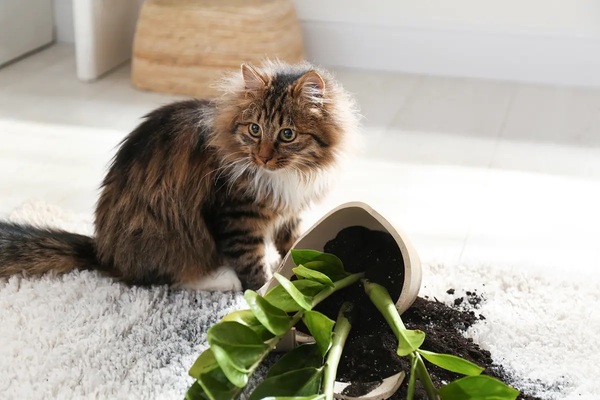If you love plants, few things are more frustrating than waking up to find that animals have been digging in your plant pots. Whether it's squirrels, cats, dogs, or birds, these curious creatures can damage your plants and make a mess of your garden. The good news is that there are simple ways to protect your pots without harming the animals. Here’s how to stop animals from digging in your plant pots, with real-life examples of what works best.

One of the easiest ways to keep animals from digging in your pots is to create a barrier between the soil and the animals. There are several options that work effectively.
Chicken Wire: Place a layer of chicken wire just below the soil's surface. The wire is flexible enough to fit into any pot and prevents animals from getting their paws into the dirt. Plants can still grow through the small gaps, but animals will find it too uncomfortable to dig.
Example: A gardener from California had success keeping squirrels out of her potted plants by cutting chicken wire to fit the top of each pot. This simple trick stopped the digging while still allowing her plants to thrive.
Stones or Pebbles: Cover the soil with a layer of decorative stones or pebbles. Animals dislike digging through these materials, and they also add a decorative touch to your pots.
Example: In the UK, a homeowner found that using river stones on top of her potting soil discouraged both her dog and the neighborhood cats from disturbing her plants.
Many animals are sensitive to certain smells, and you can use this to your advantage by applying natural deterrents that are safe for your plants.
Citrus Peels: Most animals, especially cats, hate the smell of citrus. Place lemon or orange peels around the base of your plants to deter them from digging.
Example: A New York apartment dweller noticed her indoor cat was constantly digging in her potted plants. After placing orange peels in the pots, the digging stopped completely.
Cayenne Pepper or Chili Powder: Sprinkling a light layer of cayenne pepper or chili powder on the soil can keep animals away. The strong smell irritates their sensitive noses, but it won’t harm the plants.
Example: A community garden in Texas successfully kept rabbits and squirrels out of their pots by lightly dusting the soil with cayenne pepper every few weeks.
Coffee Grounds: Another smell animals dislike is coffee. Used coffee grounds sprinkled over the soil not only deter animals but also add nutrients to the soil, benefiting your plants.
Example: A gardener in Seattle found that adding coffee grounds to her pots stopped her neighbor’s cat from digging while also helping her plants grow better.
Technology can also be an effective way to protect your plants. Motion-activated devices startle animals, discouraging them from returning to your pots.
Motion-Activated Sprinklers: These devices detect movement and spray a quick burst of water when animals get too close. It’s harmless but surprising enough to keep animals away.
Example: A homeowner in Florida installed a motion-activated sprinkler after repeated squirrel attacks on her patio plants. Within days, the squirrels stopped coming back.
Ultrasonic Animal Repellers: These emit high-frequency sounds that are annoying to animals but inaudible to humans. Place one near your plant pots to keep critters at bay.
Example: A person in a city garden found that ultrasonic repellents kept stray cats from digging in her plants without disturbing her or her neighbors.
Another great way to deter animals is by covering the soil with materials they don’t like.
Mulch: A thick layer of mulch can make it harder for animals to dig in the soil. Mulch made from pine needles or bark chips is especially effective since animals dislike the texture.
Example: In Oregon, a gardener used pine needle mulch to stop raccoons from digging in her outdoor pots, and it worked wonders.
Bird Netting: For a lightweight and easy solution, cover your pots with bird netting. The fine mesh makes it difficult for animals to get to the soil, but it’s easy for you to remove when you need to water or tend to the plants.
Example: A garden enthusiast in Arizona used bird netting to protect her succulents from being dug up by local birds. The netting was invisible from a distance but kept her plants safe.
Animals are often attracted to plant pots because they find food or other interesting things in the soil. Keeping the area around your pots clean can make your pots less appealing.
Remove Fallen Fruits or Seeds: If you have fruit trees or bird feeders nearby, clean up any fallen fruits or seeds that might attract animals.
Example: A gardener noticed that after cleaning up the sunflower seeds from her bird feeder, squirrels stopped visiting her plant pots.
Avoid Fertilizers with Bone Meal or Fish Emulsion: These types of fertilizers can attract animals due to their strong scent. Opt for plant-based fertilizers instead.
Example: After switching to an organic, plant-based fertilizer, a homeowner in California found that the neighborhood dogs stopped digging in her pots.
Animals digging in your plant pots can be a nuisance, but with a few simple strategies, you can keep your plants safe. Whether you choose physical barriers like chicken wire, natural deterrents like citrus peels, or high-tech solutions like motion-activated sprinklers, there's a solution for every situation. By making your plant pots less appealing, you'll protect your plants and keep your garden tidy, all while coexisting peacefully with the wildlife around you.
animal tags: cat
We created this article in conjunction with AI technology, then made sure it was fact-checked and edited by a Animals Top editor.